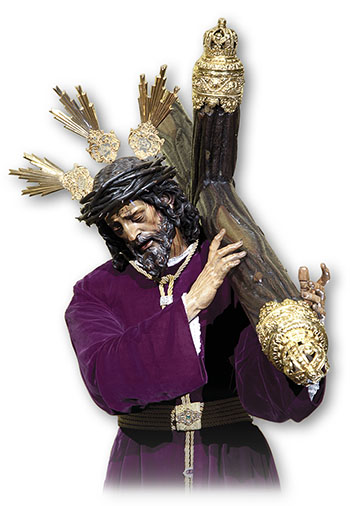“Greater love has no man than this, that a man lay down his life for his friends” (Jn 15:13). In this sublime teaching, the Divine Master invites us to imitate His own example, for He came to earth to give His life as a ransom for many (cf. Mt 20:28).
In fact, although the Redemption had multiple effects, the principal aspect of Our Lord’s mission consisted in His being the Victim of propitiation for our sins, as the Apostle wrote: “The saying is sure and worthy of full acceptance, that Christ Jesus came into the world to save sinners” (1 Tim 1:15). Isaiah had already prophesied this when he said: “he has borne our griefs and carried our sorrows. […] with his stripes we are healed” (53:4-5).
Now, “christianus alter Christus” – the Christian is another Christ. Every Catholic is also essentially a victim, and must be ready to unite his sufferings to those of the Saviour, in order to implore graces for the world.
It is Jesus Christ who suffers in us
In view of this, many have wondered whether the most excellent Redemption wrought by the Divine Lamb has definitively purchased all the graces necessary for humanity and for all creation, or whether there is some deficiency in this supreme sacrifice which we must make up for.
To answer this question, we should first recall the words of St. Paul: “in my flesh I complete what is lacking in Christ’s afflictions for the sake of His Body, that is, the Church” (Col 1:24). All of us who have been baptized have been formed from the flesh of Jesus and from His bones; the grace that made Him our Head is the same grace that made us His members; His life is our life.1 Our sufferings, therefore, are accepted by the Father as coming from His own Son. Thus, in no way do we have to make up for any “deficiency” in the Sacrifice of Calvary, but, by virtue of this supreme offering which divinizes our souls and our acts, and by a divine design, our sufferings become meritorious.
For this reason, it is of great benefit to the Church that we unite ourselves to the mystery of Redemption and bear our sufferings with courage, for the Saviour, who in His glorified humanity can no longer suffer, desires to suffer in us in order that He may continue in this way to save souls.2
How does this happen?
There are degrees of being a victim
The Gospel states that in the Father’s house “there are many mansions” (Jn 14:2[DR]) because, although the Kingdom of Heaven is the same for all the just, there are different ways leading to it. In an analogous way, even if the call to be a victim is common to all the baptized, it has its degrees and is carried out in different ways.
The ordinary way, to which all are called, requires only that the soul fulfil its baptismal duties with rectitude: “The Christian who observes only, but faithfully, the Commandments of God and of the Church and lives, therefore, truly united to Our Lord, lives the life of a victim.”3
Indeed, great courage and patience are needed to face the struggles inherent to this valley of tears, and this spiritual effort rises to God as a sacrifice of pleasing odour. To this path of holiness we are invited: “I appeal to you therefore, brethren, by the mercies of God, to present your bodies as a living sacrifice, holy and acceptable to God, which is your spiritual worship” (Rom 12:1).
The special way of consecrated persons
Standing out from the general number of the faithful, there are certain souls who are not content with the simple practice of the Commandments and who generously set out on a more arduous path, desiring to attain greater identification with the Divine Master. These are the priests and those consecrated to God who, through the practice of the evangelical counsels, have the mission of embracing more especially the state of victim:
“To tend toward union with the adorable Victim is indeed an essential duty of the Christian, but to tend toward the perfection of union is an essential duty of the religious.”4
Impelled by great love, these resolve to carry not only a portion of Our Lord’s Cross, but to carry it entirely, not counting the cost or thinking of their own fatigue, nor even of the merits they may acquire. Their only aim is to console and relieve the Heart of God.
The consecrated soul submits itself to an “immolation without reserve, without any hope of one day leaving the altar of sacrifice,”5 and renounces personal will, criteria and sentiments in a veritable unbloody martyrdom which does not end life but rather renews death with Christ each day (cf. 1 Cor 15:31) in order to rise with Him to a supernatural life.
The simple daily life of these souls draws down to earth the most profuse heavenly blessings and obtains for sinners efficacious graces of repentance and conversion. The example of St. Therese of the Child Jesus, who with her small sacrifices – laden with the loftiest intentions – was harvested by the Good Lord as a victim of holocaust to the merciful Love of Jesus, provides wonderful proof of this.
Consecrated persons are thus the heart of the Church, charged with pumping the life-giving blood of grace to all her members.
Specific call to expiation

The third and most excellent degree of being a victim corresponds to particularly chosen souls, called to express to the Father “the sentiments of Christ Jesus.”6 They are those known as expiatory victims.
For this path of perfection there is a reservation: “Although strictly speaking one can offer oneself as a victim to give God joy and glory by voluntary sacrifice, yet for the most part God leads souls by that path only when He intends them to act as mediators: they have to suffer and expiate for those for whom their immolation will be profitable, either by drawing down graces of forgiveness on them, or by acting as a cloak to cover their sins in the face of divine justice. It stands to reason that no one will on his own initiative take such a role on himself. […] He himself chooses these persons, and because they are free, He asks them for their voluntary co-operation. Those who accept put themselves at His mercy, and He then makes use of them as by sovereign right.”7
In giving themselves entirely to God’s will, they become “finished copies of the Crucified. […] the Passion of Christ, after marking them with its sign, passes through them, in order to bring about in the sinner for whom they suffer the graces of the sacrifice of Calvary.”8
Victim souls know that even their most ardent acts of faith and their best resolutions have no substance or strength if they are not corroborated by suffering. For them embracing the cross is a demand of their fidelity to God, and it sums up their existence.
Living crucifixes
The Jesuit priest Monier-Vinard, in the introduction to the book The Way of Divine Love, on the revelations of the Sacred Heart of Jesus to Sister Josefa Menéndez, beautifully describes the vocation of an expiatory victim:
To draw back souls fallen away from the Faith, “Christ will seek to reach [them] through other souls whom He makes use of as channels of His mercies. They are the most fruitful of all the branches of the mystic vine. Loaded with the sap flowing from Christ Himself, […] in them and by them, grace is communicated. They are victim-souls.
“How intimate must be their identification with the Crucified if they are to carry out their part of the contract fully! Full union with Him is implied, whilst He on His part imprints on their souls, hearts, and bodies the living image of His sorrowful Passion. All His sufferings are renewed in them: they will be contradicted, persecuted, humbled, scourged, and crucified; and what man fails to inflict, that God Himself will supply by mysterious pains, agonies, stigmata, which will make of them living crucifixes. […]
“They are thus co-redeemers in the full sense of the word; love for their neighbour urges them on, their mission is different from that of others. […] It is the love of the Sacred Heart Itself, communicated to them, with which they love sinners; love which gives them a superhuman endurance.”9
Those who feel within themselves the clear call to be expiatory victims must prepare themselves for an authentic mystical espousal with suffering, but also rejoice in the certainty of being able to truly console God, who will see in them the image of His own unconditional love.

Collegiate Church of the Divine Saviour, Seville (Spain)
Will we suffer like Jesus or like the damned?
And here we have a summary of the three paths of victim souls, at least one of which we will have to travel during our days on this earth as baptized persons. Frail by nature, we have a real horror of suffering, and we shudder at the sight of the smallest sacrifices that come our way. But pain is inevitable in our current state of trial, and faced with this reality there are only two paths to take: either we suffer in union with Our Lord Jesus Christ, exercising our role as victims – in accordance with our personal vocation – and obtaining merits for eternal life; or we will suffer like the demons and damned, embittered by rebellion and on our way to hell.
However, since we are incapable of walking the path of sanctity on our own, let us know how to turn to Her who, with a simple smile, can give us strength for everything, and let us say to Her: “O most holy Mary, sorrowful Queen and my Mother, I want to embrace the cross with all the energy and with all the joy of my soul. However, I am not moved to do so… Give me the grace that one of the tears that You shed during the Passion will have been for me. Thus I shall have my soul transformed from a poltroon into a true hero of sacrifice!”10 ◊
Notes
1 Cf. GIRAUD, MS, Sylvain-Marie. O espírito e a vida de sacrifício no estado religioso. 2.ed. Petrópolis: Vozes, 1951, p.17.
2 Cf. LEHODEY, Vital. Le saint abandon. 7.ed. Paris: J. Gabalda, 1935, p.74.
3 GIRAUD, op. cit., p.20.
4 Idem, p.63.
5 Idem, p.28.
6 MONIER-VINARD, SJ, H. Introdução. In: CHARMOT, SJ, F. Apelo ao amor. Mensagem do Coração de Jesus ao mundo e sua mensageira Sóror Josefa Menéndez. 4.ed. Contagem: Líttera Maciel, 1998, p.12.
7 Idem, ibidem.
8 Idem, p.15.
9 Idem, ibidem.
10 CLÁ DIAS, EP, João Scognamiglio. Meditação sobre a Última Ceia [Meditation of the Last Supper]. São Paulo, 1/3/1994.


